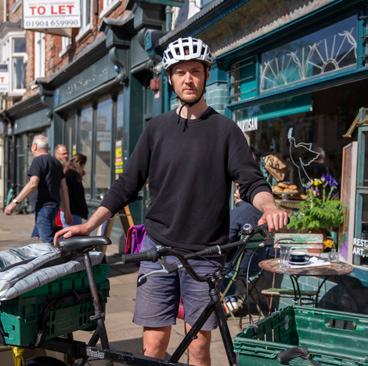
3 minute read
The ‘Whaddabouts’
Freight weight
You can’t carry a sofa on a bicycle, or can you? Cycles are far more versatile than you might expect. With the right equipment, remarkable things happen. Add electric assist and suddenly it’s possible to move house through pedal-power alone. The London-based couriers PedalMe carry up to 300kg on their trailers. (To put that into perspective, a fridgefreezer weighs considerably less than 100kg). For commercial operations, the so-called “final mile” of deliveries are the tricky ones which is why multinational logistics firms are increasing turning to e-cargo bikes for city centre deliveries. At the moment in York we still see enormous HGVs squeezing through the centre, crushing pavements, taking chunks off historical buildings, endangering pedestrians and generally ruining the atmosphere. They’re necessary vehicles but not for the final mile. A people-first York will have a transhipment hub on the outskirts, from which e-cargo bikes will be able to pick up our orders, from books to baths, and deliver them safely and easily to city centre addresses.
Wheels for wellbeing

Research by the charity Wheels for Wellbeing shows that for the vast majority of disabled cyclists, cycling is easier than walking. It’s misleading to assume that disabled people can’t ride cycles when in fact the opposite is true. Cycling brings independence and door-to-door access that driving does not provide, especially with Blue Badge parking being increasingly removed. Cycles can be used as mobility aids, often used by people with disabilities which are invisible until they dismount. E-bikes have opened this up still further, allowing people with conditions such as arthritis or fibromyalgia to travel longer distances with ease, whilst enjoying the benefits of low-impact exercise.

Old people, new bikes
Say it with us: e-bikes are the future! Much like with disabled people, there is a misconception that elderly people can’t ride bikes. But they can and they do! As e-bikes become more widely available and usable, cycling is becoming increasingly accessible to people who may previously have thought that the only option left to them was the car. More freedom, greater autonomy, and less impact on joints than walking: cycling is ideal for people of all ages.
Shopping reimagined
You can carry far more on a bicycle than you might expect. Like most things, it’s about using the right tools for the job. That might start with a permanently attached basket, panniers (bags that hang on either side of the back wheel), or a trailer, and then there’s e-bikes and cargo bikes. Many families manage the entire weekly shop with ease this way, even if it does require being a little more choosy when perusing Aldi’s middle aisle!

There’s no such thing as bad weather
The UK and the Netherlands experience very similar weather yet the Dutch cycle far more regularly than the Brits, as does virtually all of snowy Scandinavia. Why is this? For a start, the weather here (or there) is not nearly as bad as we think. (It simply isn’t!) And because when it does rain, all that’s required are the right clothes; whether a foldable poncho or lightweight waterproof jacket, protection is inexpensive and effective and used far less frequently than one might imagine. As Mr Wainwright said, “There’s no such thing as bad weather, only unsuitable clothing.”
Heels and wheels

Like wet weather cycling, what you need are the right tools for the job, and to look at how they do it in the Netherlands. Upright “Dutch bikes” are designed to be used whilst wearing everyday clothing – there’s no lycra required (unless you’ve a burning desire to wear it). With their gears, chain and brakes enclosed, plus a guard over the wheel, long dresses and coats don’t get tangled in anything. And by cycling directly from door to door, it actually means you can wear your fancier shoes because you don’t need to walk so far! City cycling is chic and convenient and a great excuse to wear floaty dresses and skyscraper heels.

Hair. AKA helmets
Worried about messing up your hair in a helmet? Then don’t wear one. Helmets are not a legal requirement and an entirely personal choice. More car passengers than cyclists suffer head trauma every year and inactivity kills more people than cycling-related head injuries. So if it’s a choice between driving instead of cycling, or cycling without a helmet, statistically you’ll live longer doing the second.
Will vs the hill
Now this one really is an excuse. Even mountainous Austria has higher cycle usage than the UK and there really aren’t many hills in York. (The hills are, of course, part of the point: it’s where you get your exercise.) But if you’re intimidated by the thought of Micklegate then fear not. Modern bikes are pretty light and have gears that will get you up a mountain And then there’s e-bikes, of course....







